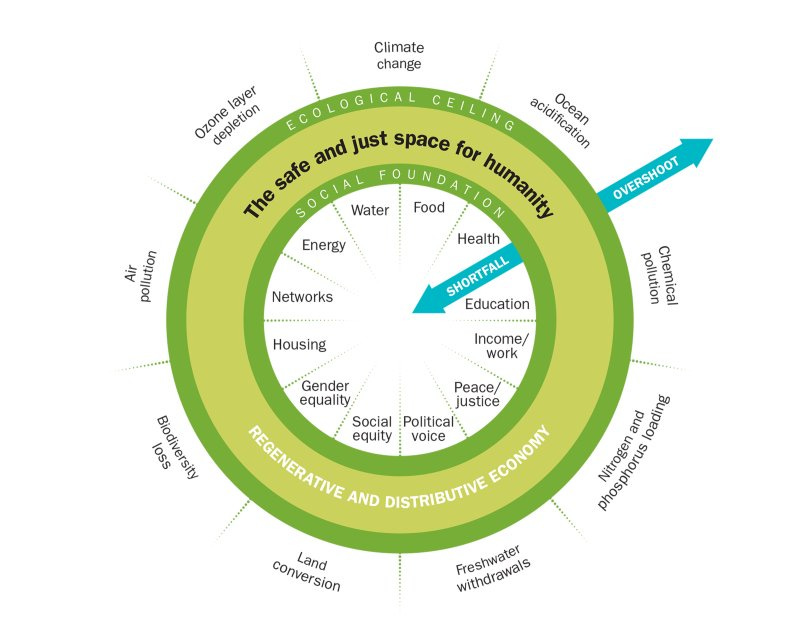Four Top-Notch Articles To Know About
From experiments in Amsterdam to a conversation about system change
It seems as though the first 45 days of 2021 have brought out an inordinate number of great essays and long-reads. Before I highlight and summarize four of them, I want to send a hearty 👋 to all the new readers coming from the For The Interested newsletter. Welcome!
Now onto some outstanding reads to dig deep into. Or to just know the highlights of, so you can know what’s going on at the edges.
🍩 Amsterdam Is Embracing a Radical New Economic Theory to Help Save the Environment. Could It Also Replace Capitalism?
There have been a few writers of pandemic times who’ve espoused the belief that the shock of covid could be the silver-lining opportunity for beneficial individual and systemic change (like René Kladzyk, Charles Eisenstein, and Azrya Bequer). Disruptions of capitalism, universal basic income, universal health care, and general cooperation across boundaries are included. Ideas that seemed impractical or fringe (i.e., outside of the Overton Window) can now be considered — and put into practice.
This TIME Magazine article documents the nascent experiment in Amsterdam and — it turns out — quite a few other municipalities. It’s a test of something called “doughnut economics.” Whereas capitalism espouses growth at all costs, leaves harmful externalities out of the model, and breeds an insane level of inequality, doughnut economics purports to bring the lowest income brackets up to base level middle class while curbing the excesses and externalities of the system. A helpful infographic:
Read this exciting article here. To dig deeper into doughnut economics, go to the source here.
💰 The Diderot Effect: Why We Buy Things We Don’t Need
Writer Anne-Laure Le Cunff of Ness Labs has a knack for describing mindsets and mental models with a pristine clarity. Her rundown of the “Diderot Effect” is exceptional.
What’s the Diderot Effect? It’s something we’ve all done. I remember the first pair of nice jeans I bought half a lifetime ago — the first kind that I could dress up if needed. Once I had and enjoyed that new pair of jeans, my old, tattered jeans, and all the shirts I used to wear suddenly felt shlubby. It created an impulse to upgrade the whole dang outdated wardrobe.
This is an experience that French writer and philosopher Denis Diderot had. It’s become known as the Diderot Effect, and it’s the mindset that fools us into thinking we need new things purchased that we don’t actually need. This article explains the origin and the mental model, and offers incisive clues for cutting down the process. It’s a helpful shift in perspective: why chase paper to buy things we don’t need?
Read about the Diderot Effect and what we can do about it here.
⛓️ Stories of Slavery, From Those Who Survived It: The Federal Writers’ Project narratives provide an all-too-rare link to our past.
I’ve written before here about the hidden truths of the American experience, and how important I feel it is for the collective to have a clear rendering of our history. I was drawn to this crucial, challenging article documenting The Federal Writers’ Project. This was a New Deal initiative in the 1930s that aimed to collect the oral histories of thousands of Americans, including over 2,300 first-hand accounts from formerly enslaved people.
…so much of Black history is underreported, misrepresented, or simply lost. How so many stories that would give us a fuller picture of America are known by so few Americans.
This retrospective showcases so many heartbreaking nuances to the story of chattel slavery. By inviting a “real, living, breathing human being” to speak truth through these interviews, it makes real the statistics. It also begs the question: what would happen if the federal government created a new initiative for capturing the many untold stories of under-represented communities of the American story?
Read the full Atlantic retrospective here.
🌎 The Origins Of ‘Planetary Realism’ And ‘Whole Earth Thinking’
Great solace and inspiration can be sourced from a well-facilitated fireside chat between two incomparable elders of systems change. I’d love to see the unabridged version of this. It’s a wide-ranging conversation between writer and Long Now Foundation founder Stewart Brand and former California Governor Jerry Brown, facilitated by Noema Deputy Editor Nils Gilman.
True to the participants’ careers, the conversation takes a long-view look at planetary challenges and the solutions we might engineer. They explore the origins of each of their worldviews on systems change. They find shared sentiment about the “intimacy” and “immortality” of our cities, compared with the transitory nature of nations and their politics.
One quote centering on Brand’s optimism:
I see a chance in this century for civilization to get out of its adolescence, to become more mature, pragmatic, skeptical and solution-oriented (rather than story-oriented) so that we can reverse planetary degradation.
Read the whole (sadly, abridged) conversation here.
Thanks for reading. Hope you’ve found some or all of these helpful in your learning journey. Be well,
-Griff

